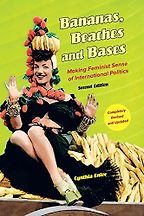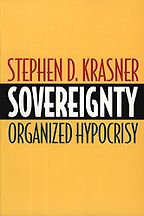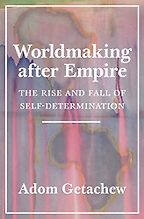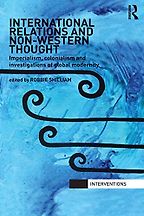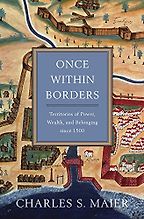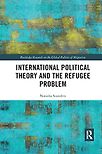Thank you for recommending five books to introduce readers to international relations. It’s a very broad discipline, but would you be able to give a brief overview of what we mean when we talk about ‘international relations’?
What we mean by international relations very much depends on who you ask. I’d say that there is a narrow answer, and there’s an expansive answer.
In a narrow sense, we can think about international relations as exactly what the term seems to imply: relations between nations or, more accurately, states. So, for lots of scholars, this is how we should understand the discipline. We should focus on understanding what states do and why. Even more narrowly, for some, the kind of states that we should be focused on are the most powerful ones in the system.
A more expansive view, like the one that I take, would be to treat the subject as the study of global politics more broadly. States are global political actors and what they do is important; but there is a great deal more to global politics than what states do and, specifically, what powerful states do.
There are lots of other actors that help shape global politics: we can think of NGOs and charities, regional organisations, courts, non-state actors like groups engaged in political violence, transnational activist networks, corporations and their workers, and so on. So, I take a more expansive view of what international relations is. It’s simply the attempt to understand global politics.
Many introductions to international relations might start with the ancient Greek philosopher Thucydides or enlightenment thinkers like Thomas Hobbes, but these don’t feature in your recommendations. What criteria did you use when selecting your titles?
There are lots of different criteria that I could have used. One would have been: what texts are usually considered canonical texts in international relations? So, books like Man, the State, and War by Kenneth Waltz, or The Tragedy of Great Power Politics by John Mearsheimer. These books have been hugely, hugely influential to the development of the discipline—and they’re definitely worth reading—but there are lots of introductory lists like that already.
I decided, instead, to start from the more expansive understanding of what global politics is and think about some of the challenges that we’re currently facing that might make somebody interested in global politics or might make someone extremely frustrated by global politics.
I thought about what texts might be able to say something to that person—not necessarily something they would agree with, but something that might deepen their curiosity.
I also wanted to take into account the breadth of intellectual ideas that the discipline is starting to draw upon, and the different theoretical and methodological approaches taken by scholars of international relations to understanding some of these challenges that we’re facing.
I think your first selection really speaks to that intention. Cynthia Enloe begins Bananas, Beaches and Bases: Making Feminist Sense of International Politics by asking a simple question: where are the women? How does this question influence her reading of international relations and what insights does it lead her to uncover throughout the book?
It’s a deceptively simple question: where are the women?
What that question did for Enloe, and does for us, is open up entire realms and registers of life as important spaces where global politics is constructed, and is lived, in ways that are often highly gendered. And by being gendered they are, of course, by default political.
The realms that are opened up by this deceptively simple question include spaces at the margins of places that we already considered political: corridors and secretaries’ offices and the diplomatic homes of people that we already recognise as global political actors. But it also opens up spaces that don’t seem to be political at first glance: places like brothels, tourist resorts, sweatshops, movie sets.
One of the examples that Enloe uses is an issue that everyone recognises as central to global politics: military force. Asking where the women are on and around military bases—particularly in a network of military bases, like the US has—shows us that security relations can be affected not just by formal relationships between governments, but the everyday relations on and around these military bases. There are policies that govern and structure life on and around these bases. These policies are, Enloe argues, highly gendered.
Get the weekly Five Books newsletter
Military marriage policies, it turns out, play a role, and have played a role historically, in international security politics. Policies relating to dating and sexual relations or violations of those policies, impact on the relations between soldiers and contractors on the bases, representatives of one state, and local men and women. And, these relations themselves impact on the relationship between the US and the state hosting the base. There’s a politics of dating, sex, and marriage on and around the base, which you won’t see if you don’t ask: ‘Where are the women?’
The book as a whole surveys a number of these kinds of spaces and practices, which may not necessarily be seen as political at first glance. It shows not only how they’re highly gendered and thus political by default, but that these spaces and practices help construct global politics itself.
So, Cynthia Enloe criticises the traditional approach to international relations’ obsession with the sovereign nation-state as the driver of world politics by shifting the reader’s focus to the everyday lives of women. However Stephen Krasner, in his book Sovereignty: Organised Hypocrisy, does focus on the sovereign state. Why is his exploration of sovereignty’s meaning important for readers interested in learning more about international relations?
Sovereignty is such an important issue right now. We can think about Russia’s invasion of Ukraine; its claims of threats to its own sovereignty; issues surrounding Taiwan; China’s attempts to control the South China Sea; the role that something called sovereignty is playing in Brexit; or the reluctance of states to sign up to the International Criminal Court. People engaged in genocide often defend themselves in terms of the protections that sovereignty offers. But, then there’s also the complete disregard for sovereignty and borders and territory that climate change poses.
So, I think this is a really important time to encourage people to really think about what sovereignty means. And I think Krasner’s book, although it has its faults, does a good job of foregrounding different dimensions of sovereignty, and exploring how sovereignty relates to ideas of control and authority in a way that troubles an overly simplistic, but politically very convenient view that a commitment to something called sovereignty compels us into a particular course of action, such as leaving the European Union in an effort to take back control of what has never really been made clear to me.
“Most of the discourse on the Leave side of Brexit seemed to be about what Krasner calls ‘interdependence sovereignty’”
But Krasner’s book can help here too, I think. He sets out four ways of thinking about what sovereignty means and relates these to authority and control. So, with the case of Brexit, is the UK looking to get control over transnational movements of goods and people? Krasner calls this interdependence sovereignty. Or is the UK seeking to regain control of who or what exercises authority in the UK? This is a different kind of sovereignty—what Krasner calls Westphalian sovereignty. Another option could be: does the UK think that being in a regional organisation, like the EU, takes away the recognition of it as sovereign by other states? That’s international legal sovereignty. Or, is Brexit a way of regaining authority and effectiveness of the government domestically? So, domestic sovereignty.
I think most of the discourse on the Leave side seemed to be about what Krasner calls interdependence sovereignty. And, I think the book helps show how we shouldn’t necessarily equate the loss or decrease of one of these kinds of sovereignty, say interdependence sovereignty, as a loss of sovereignty, per se. A decrease or loss of the ability to control cross-border movements might actually lead states to enter into formal agreements with each other (which itself is an exercising of sovereignty), voluntarily reduce their Westphalian sovereignty (so, allow external actors to exercise some authority), but in doing so, increase their interdependence sovereignty.
There are many political actors who I think would like sovereignty to mean just one thing, but it doesn’t. And I think that Krasner’s book shows that quite well.
Your next recommendation is Adom Getachew’s Worldmaking After Empire which uncovers the history of ‘anti-colonial worldmakers’ such as Ghanaian nationalist Kwame Nkrumah and African-American sociologist W.E.B. Du Bois. What does Getachew mean by ‘anti-colonial worldmaking’ and where does this book fit within the international relations canon?
The book, as you mentioned, studies the global projects of decolonization spearheaded by black Anglophone, anti-colonial critics and nationalists after World War II. The really important part to note here is ‘global projects’. When we think of decolonization, we often think of it in national terms: a series of individual nation-building projects, which cumulatively bring an end to colonialism. And, colonialism itself is understood as a series of bilateral relations of direct domination by one state over another people.
What Getachew does through her archival work is argue that we should, instead, see decolonization or decolonial nationalism as attempts at world-making. Attempts to reinvent institutions globally: juridical institutions, political institutions, and economic institutions that would enable the achievement of genuine self-determination, understood as non-domination.
“We can understand decolonisation, the attempt to dismantle the colonial world, as simultaneously an attempt to build a new one in its place”
Getachew thinks this is a valuable thing to do because we often now think of nationalism as this kind of parochial, anti-universal thing. And there are lots of examples of when and where that is true. But the archives and the thought that Getachew is working with show a very different attempt at understanding and instituting nationalist projects that sought, certainly in the beginning, to be anti-parochial, to be universal. They ultimately failed for a number of reasons, but they, in many ways, prefigure many of the questions and debates we’re having now about global justice in a political and economic sense.
So, the term ‘anti-colonial worldmaking’ is exactly what it implies. If European imperialism and colonialism was world-constituting, in the sense that it made a particular kind of world, then we can understand decolonisation, the attempt to dismantle that world, as simultaneously an attempt to build a new one in its place.
And, for the people that Getachew is studying, a new world order required more than simply the formal independence of colonies. It required that relations of economic dependence and inequalities of power between newly-independent states be dismantled, and that new political and economic institutions to foster this new non-dominating system be instituted.
This history isn’t one that is usually taught to students of international relations, certainly when they first start. Political discourse now is full of references to challenges to the post-World War II order, usually in the form of the rise of China. But the post-World War II order itself was the subject of fierce debate and disagreement. For the European states, the dominant frame of reference for refashioning the world was World War II. For colonised peoples, it was colonialism. What it meant to remake the world, post-World War II, differed depending on where and who you were. So, I see this book more as a recovery of a history that isn’t often taught to our students.
The collection of essays presented in International Relations and Non-Western Thought: Imperialism, Colonialism and Investigations of Global Modernity is similarly concerned with contributions that have often, unfortunately, been sidelined in mainstream international relations. I wonder if you could talk us through this recommendation?
This recommendation kind of relates to your earlier question about what kinds of starting points many standard international relations texts seem to have, either consciously or subconsciously. Often, they’re rooted in European Enlightenment thought. This is what we might loosely call a Western epistemological and ontological framework.
This book is a collection of essays, edited by Robbie Shilliam, who himself is a brilliant scholar, and I definitely recommend his work to everybody. It explores non-Western considerations of modernity, within the context of imperialism and colonialism, which at various points were argued themselves to be modernising projects. As as a volume, it takes seriously the impact of imperialism and colonialism, not only on the social, economic, and political structures in which colonised people lived, but also on their impact on thought: how people thought about their past and their present and their future, whether that be in terms of resignation to the power and logics of colonialism, appropriation of certain aspects of the discourse of colonialism and modernity, or resistance to it.
In many ways, international relations as a discipline has been guided in its development not only by the issues that academics and policymakers in the white, Anglosphere have found to be important, but also by how we think: our conceptual repertoires, how we understand enlightenment, progress, development and modernity. And, of course, by extension, the opposite.
Five Books interviews are expensive to produce. If you're enjoying this interview, please support us by donating a small amount.
The essays in this volume try to show that there isn’t just one way to think about any of these things, but many different ways that are informed by many different experiences, and foreground the ways in which intellectuals in these colonised spaces sought to make sense of the world as they were experiencing it. It’s a really tough volume, especially for people who might be coming to non-Western canons of thought for the first time. So the introductory essay by Robbie Shilliam is a really great place to start, because it sets out for the reader just how challenging it is, as an intellectual enterprise, to engage with this thing that we’re calling non-Western thought. We need to be aware of how non-Western cultures and systems of thought have been essentialised and exoticized—even calling them all non-Western is already to engage in a kind of essentialism—and how to be on guard against continuing that. So, it’s a very tough read, but it’s one that’s well worth persisting with, and I think will help people who are interested in international relations to broaden their conceptual horizons.
In many ways, your final recommendation, Charles S. Maier’s Once Within Borders, returns back to our previous discussion of Brexit and sovereignty—and, particularly, sovereignty’s tension with globalisation. Why is this book a good introduction to this tension?
I think, rather than an introduction to the tension, I would characterise this book as more of a questioning of the self-evident novelty of that tension—which isn’t to deny that the tension exists, but it is to ask how new that tension really is.
Maier is a historian. And, what he’s doing here is trying to trace over 500 years of thought and practice around the role of territory and what it means to think territorially—and how this has shaped the global political map. Territory, he argues—and political geographers would agree—isn’t just land. It’s a global space that has been partitioned for the sake of political authority. So, we can assume, then, that as ideas of political authority shift, as ideas of what sovereignty means shift, for example, so too may ideas about territory. Just like we can study how ideas of authority have changed, we can also study how ideas and practices of territory have changed.
“Territory isn’t just land. It’s a global space that has been partitioned for the sake of political authority”
This is important to do, because, as with many things that structure our daily lives, we often see territorial division into sovereign states, for example, as natural and permanent, something that has just always been there. So, when we see mounting challenges to that sense of territorial stability and control, this tends to lead to a very real sense of crisis or unease that I think we see in a lot of discourse around globalisation and the relationship between globalisation and the state.
Maier claims, importantly, though, that we can understand territory in terms of decision and identity. So, territory as a decision space and as an identity space. A decision space in the sense that turning land into territory establishes spatial boundaries or limits of legislation and decision-making. And, identity space, in the sense that we often endow territory with certain attributes that evoke collective loyalties.
What’s interesting is that there aren’t many places and times, it turns out, in the last 500 years that Maier examines, where and when people have understood their decision space and their identity space to be congruent with each other. It’s actually been much more common that the two diverge from each other, there’s a mismatch between the two. The space and time where they’ve tended to converge or be congruent with each other has been in the first three-quarters of the twentieth century in the West. So, this mismatch between decision space and identity space is being felt by more people in the West today than historically. And, I think this might be what is leading to ideas of the novelty of this mismatch—this tension between globalisation and the sovereign state.
Get the weekly Five Books newsletter
But, there are a number of other interesting things in the book that I think would be interesting to people who are interested in how the state might be changing under globalisation. There’s a discussion of cartography, or map making, and how the practice of depicting territorial control and the ways that territorial control is depicted helped shift understanding of frontiers and borders away from a more fluid, temporary thing—the early imperial boundaries, which weren’t designed to halt expansion—to the more fixed, static dividing lines we normally think of when we think of borders now. There’s also a really interesting discussion of how the Industrial Revolution gave to the developing modern state the ability to exercise control in real time, over large expanses of territory that, up until that point, had exercised only nominal control. Developments like the railroad or the telegraph or steamships helped create the modern state as we know it. I think these sorts of technological shifts are really important to think about in light of contemporary developments, like artificial intelligence, algorithmic decision making, remote warfare capabilities, shifting how territorial control is exercised where, by whom, and upon whom.
A lot of the ideas surrounding borders are explored in your own publications about refugees and asylum. How have books like the ones recommended here influenced your work?
I think that each of the five books is formed by the same desire that animates my own work: to re-examine ideas or issues that we take for granted; to draw on resources that might not seem to be the most obvious ones; to try to foreground the experiences or voices of marginalised groups.
In my own work, this has taken the form of questioning what problem it is when we talk about ‘the refugee problem,’ and exploring how different ways of understanding a problem will make different kinds of solutions seem feasible or infeasible, logical or illogical, or workable or unworkable. And, trying to think through what migrant-centred, rather than state-centred, solutions might look like. In the work I’m doing at the moment, I’m exploring the ethical challenges posed to liberal democracies by the development and proliferation of digital border control technologies: the data gathering and sharing, algorithmic decision-making, and artificial intelligence that they rely upon, from the perspective of the kinds of harms that these technologies do to those who are subjected to them.
I think good scholars remain open to different ideas and different ways of thinking. And that’s what I think these recommended reads encourage you to do.
Is there anything else you think people looking to learn about international relations should know?
That’s a hard question. I think, I would say, if you’re going to read any of the books that I recommended: be prepared for your questions to proliferate at a greater rate than answers to them. And: beware of anyone peddling a simple solution to a particular problem, especially if it’s a global political problem. Things are always going to be more complicated than you think. But, I would say embrace the complexity, don’t run from it.
Five Books aims to keep its book recommendations and interviews up to date. If you are the interviewee and would like to update your choice of books (or even just what you say about them) please email us at [email protected]
